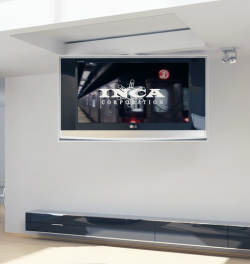This isn’t Your Father’s Wall-Mounted Flatscreen
It was the wall-mounting in the early days of flatscreens that was most responsible for launching the discussion on how not to display our TVs. We can’t be sure, but it had to be  that, mostly because that conversation wasn’t really a thing until then.
that, mostly because that conversation wasn’t really a thing until then.
The flatscreens, back then, were still fairly bulky, which made it difficult to blend them in in any kind of meaningful way. Not that most of us were trying all that hard, what with the cluster of cords hanging from the bottom of the TV and running down the wall to the socket a few feet below. In our defense, this was the first time most of us owned a TV over 30 inches. Of course it should stick out. That’s the whole point.
Even now, years later, the flatscreen significantly streamlined, the cords almost entirely gone, there’s still a bit of a bad taste. But, just as the technology’s improved, so, too, have the TV wall mounts. For starters, there’s not a cord anywhere in sight across our entire line. There’s also, even more critically, not a bad view.
Whether we’re talking the Wall-Mounted Corner Post Swivel, the Sideslider Pullout or the Glider System, there’s more flexibility in where you can install your LCD wall mount than there ever was before, because every setup is designed to provide an optimal view wherever you are in the room. Tuck it into a corner or alongside a bookshelf. In the Sideslider Pullout, the TV wall arm mount is a sturdy, linear slider that has the capacity to hold up to (and hide) a 47-inch flatscreen. A simple touchscreen command moves it into viewing position.
For you old-schoolers, there’s the Wall-Mounted Tilting Module, a more straightforward upgrade on the old hang-it-with-no-shame approach. This version tilts the flatscreen up to 30 degrees forward on command. Even you have to admit your neck was getting stiff. And the glare was doing no one any favors.


Recent Comments